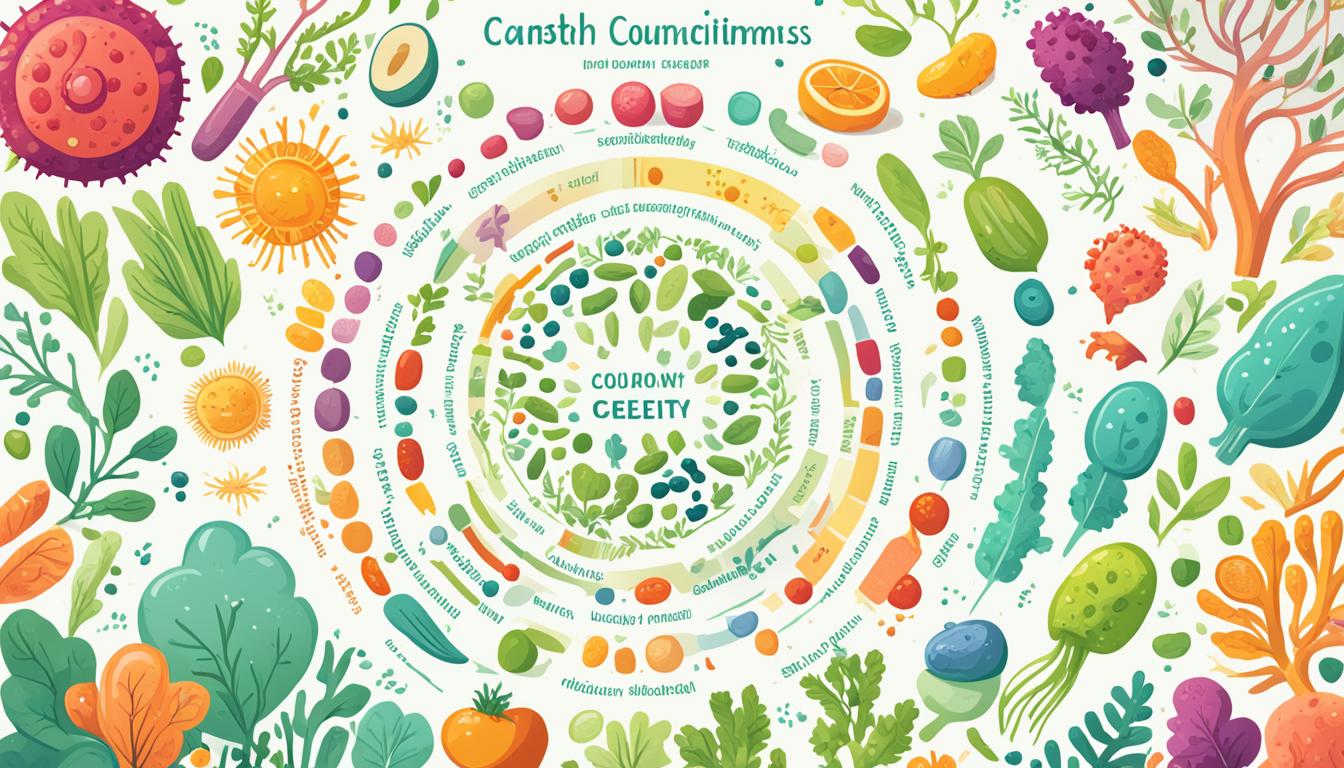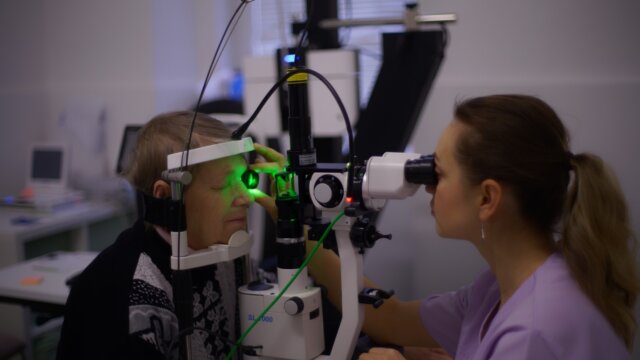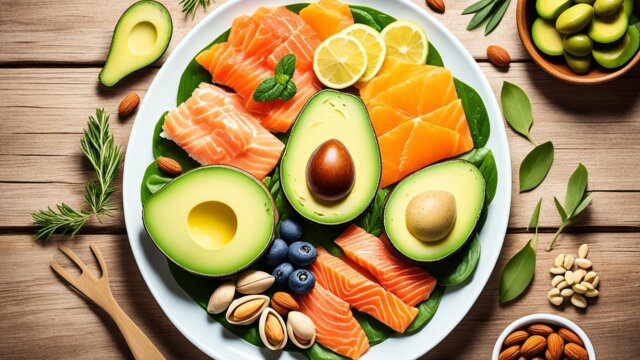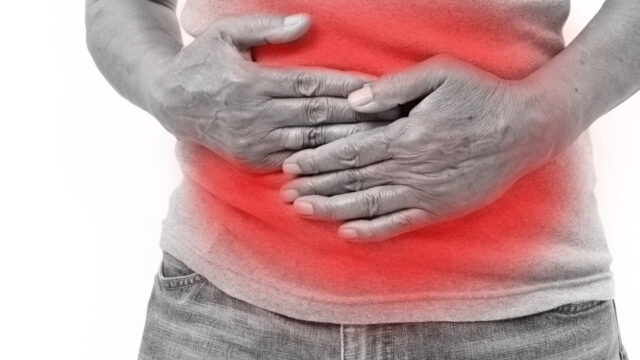FTC disclaimer: This post may contains affiliate links and we will be compensated if you click on a link and make a purchase.
Did you know you have about 200 different kinds of bacteria, viruses, and fungi in your gut? This huge group, called the gut microbiome, is key to your health. It helps lower the risk of diseases like diabetes, inflammatory bowel disease (IBD), and psoriatic arthritis. Also, a diverse gut microbiome is linked to better mental and physical health.
But, stress, not enough sleep, eating too much processed and sugary food, and antibiotics can hurt your gut health. This article will talk about why the gut microbiome matters, how to know if your gut is unhealthy, and ways to make it better. We’ll look at diet, lifestyle changes, and supplements that help.
Key Takeaways
- The gut microbiome has trillions of living microbes that are vital for your health.
- A diverse gut microbiome lowers the risk of many health problems, including digestive issues, immune problems, and mental health issues.
- Stress, bad sleep, unhealthy eating, and antibiotics can mess up the gut microbiome and cause an imbalance.
- Improving gut health with diet, supplements, and lifestyle changes can boost your physical and mental health.
- Eating foods rich in probiotics, fiber, and avoiding processed and sugary foods helps a healthy gut microbiome.
What is the Gut Microbiome?
The gut microbiome is full of trillions of microorganisms like bacteria, viruses, and fungi. These live in our digestive tract. Every person has a unique mix of these microorganisms, with about 200 different types of bacteria.
The Importance of a Diverse Gut Microbiome
Having a diverse gut microbiome is key to staying healthy. Studies show it lowers the risk of many health issues, like diabetes and inflammatory bowel disease. It also helps our immune system, metabolism, and even our mental health through the gut-brain axis.
How the Gut Microbiome Affects Overall Health
An unhealthy gut microbiome, called dysbiosis, can lead to many health problems. Things like losing good bacteria, growing bad bacteria, or losing diversity can cause it. Diet, chemicals, and medicines can also change our gut microbiome. Eating lots of plant fibers helps, but too much sugar, fats, or alcohol can hurt it.
Keeping our gut microbiome healthy is vital for our overall health. It supports our immune system, metabolism, and mental health. Eating well, staying active, and having regular bowel movements can help keep our gut balanced.
“The human gut microbiome can comprise up to 1,000 species of bacteria, each playing a unique role in the body.”
Health Condition | Relation to Gut Microbiome Dysbiosis |
|---|---|
Infections | Can be caused by an imbalance in gut bacteria |
Small Intestinal Bacterial Overgrowth (SIBO) | Directly related to an overgrowth of bacteria in the small intestine |
Inflammatory Bowel Disease (IBD) | Linked to dysbiosis and reduced microbial diversity |
Atherosclerosis | Certain gut bacteria can contribute to the development of blocked arteries |
Symptoms of an unhealthy gut microbiome include diarrhea, inflammation, and damage to the gut lining. It can also increase the risk of heart disease. While there are tests to check the gut microbiome, doctors usually prefer blood, stool, or breath tests for specific conditions.
Signs of an Unhealthy Gut
Keeping your gut healthy is key for feeling good overall. It helps with digestion, getting nutrients, and fighting off sickness. But, if your gut’s balance is off, you might feel bad and have health problems.
One big sign of a sick gut is stomach trouble like gas, bloating, or diarrhea. You might also notice you’re gaining or losing weight without trying.
Other signs include trouble sleeping, feeling tired all the time, and skin issues like acne or eczema. Your gut also affects your mood, leading to feelings of sadness, worry, or headaches.
Autoimmune diseases, like thyroid problems or rheumatoid arthritis, can start in an unhealthy gut. Stress, not sleeping well, or taking antibiotics can hurt your gut and cause these issues.
Knowing the signs of a sick gut lets you fix it. Listen to your body and take steps to help your gut. This can make you feel better overall.
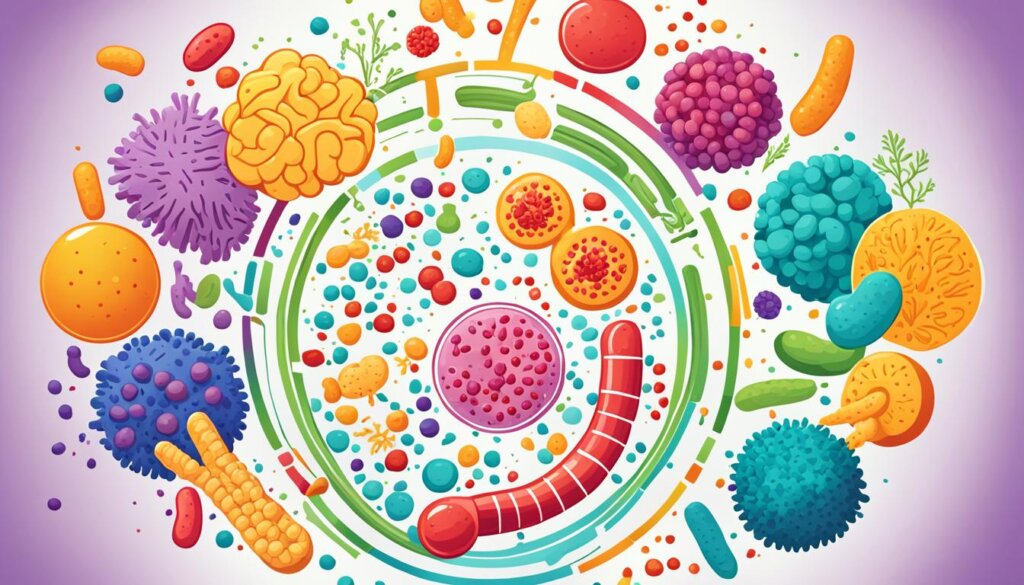
Improving Your Gut Health
Your gut microbiome is key to your health and happiness. You can make changes to help your gut bacteria. Let’s look at some ways to boost your gut health.
Reduce Stress and Get Enough Sleep
Stress and lack of sleep hurt your gut microbiome. Reducing stress with meditation, yoga, or mindfulness helps your gut bacteria. Getting enough sleep is also important for gut health.
Eat Slowly and Stay Hydrated
Eating slowly helps your digestion and makes you feel better. Chewing well breaks down food for better nutrient use. Drinking lots of water also helps your gut bacteria.
Lifestyle Factor | Impact on Gut Health |
|---|---|
Stress Reduction | Helps restore gut microbiome balance |
Adequate Sleep | Plays a key role in maintaining gut health |
Slow Eating | Aids digestion and reduces digestive discomfort |
Proper Hydration | May increase gut bacteria diversity |
These simple changes can help you improve your gut health. They support your overall well-being. A healthy gut means a happy mind and body.

Gut Microbiome and Diet
Your gut microbiome is full of tiny living things that affect your health. Eating foods high in fiber helps these good bacteria grow. Foods like fruits, veggies, whole grains, nuts, and beans are great for your gut.
High-Fiber Foods for Gut Health
Eating more fiber can make your gut microbiome healthier. Research shows diet changes can quickly change your gut in mice. A diet full of fiber feeds the good bacteria, making you healthier.
Fermented Foods and Probiotics
Foods like yogurt, kefir, sauerkraut, and kimchi are good for your gut. They have live bacteria that help your gut stay balanced. Adding these foods to your diet supports a healthy gut.

“Approximately 100 trillion micro-organisms, including bacteria, viruses, fungi, and protozoa, exist in the human gastrointestinal tract, defining the gut microbiome as a virtual organ of the body.”
Eat foods high in fiber, fermented foods, and probiotics to help your gut microbiome. This can make you feel better overall.
The Role of Prebiotics
Prebiotics are a special kind of fiber that feed the good bacteria in your gut. Foods like onions, bananas, and whole grains are full of these fibers. These fibers help the good bacteria grow and work better.
The gut is home to many types of bacteria, making up four main groups. Together, they have about 600,000 genes, which is more than our genes. Eating more foods high in prebiotics can make your gut healthier.
Inulin is a prebiotic found in many plants, especially chicory root. Other prebiotics like FOS, GOS, XOS, lactulose, and COS also help with digestion and more.
Eating more prebiotics helps the good bacteria in your gut grow and work better.

Gut Microbiome and Lifestyle Factors
The gut microbiome is full of tiny living things in our digestive tract. It’s affected by what we eat and our lifestyle. Being active helps keep our gut healthy. But, antibiotics can harm the balance of our gut bacteria.
Exercise and Gut Health
Studies show exercise is good for our gut. It helps good bacteria grow, making our gut more diverse. This diversity is linked to better digestion, a stronger immune system, and less inflammation.
The Impact of Antibiotics
Antibiotics are needed for some infections but harm our gut microbiome. They kill both good and bad bacteria, upsetting our gut balance. This can lead to more infections, digestive issues, and autoimmune diseases. Eating foods high in probiotics or taking supplements can help fix this.
Lifestyle Factor | Impact on Gut Microbiome |
|---|---|
Regular Exercise | Increases diversity and growth of beneficial bacteria |
Antibiotic Use | Disrupts the delicate balance of the gut ecosystem, killing both harmful and beneficial bacteria |
Our gut microbiome is shaped by more than just food. Exercise and antibiotics also play a big role. Knowing this, we can make choices to keep our gut healthy and diverse. This is key for our overall health.
Gut Microbiome: A Fascinating Frontier
The study of the gut microbiome is growing fast. Research shows it greatly affects our health. Scientists are learning how it helps our body in many ways, like with our immune system, metabolism, and even our minds. This area is very interesting, and learning how to keep our gut healthy can really help us stay well.
New studies show how the gut microbiome affects our health when we get sick. People with diverse gut bacteria do better when fighting cancer. But, using antibiotics and an unhealthy gut can make treatments less effective. This shows how important it is to keep our gut bacteria balanced.
Researchers are also looking at the gut microbiome and diseases like Parkinson’s. They found certain bacteria and less good fats in people with these diseases. This could mean the gut microbiome might help prevent or treat these diseases.
As we learn more about the gut microbiome, we see more ways it can help us. This could lead to new ways to eat and new treatments. The gut microbiome is a big area that could change how we handle many health issues.
“The gut microbiome is a complex and dynamic ecosystem that plays a crucial role in our overall health and well-being. Understanding its intricate workings is key to unlocking new avenues for prevention, treatment, and personalized care.”
Statistic | Value |
|---|---|
Median time for a muffin dyed with blue food coloring to pass through the gut | 28.7 hours |
Weight of the gut microbiome | Approximately 2kg, larger than the average human brain |
Number of genes in the gut microbiome compared to the human genome | At least 150 times more |
Percentage of microbial populations that have not been cultured in a lab | 70% |
Recommended daily fiber intake for gut microbes | 30g, while the average intake in the UK is 10-15g |
Cost of the ZOE personalized diet program in the US | $360 for six months |
Percentage of gut microbes shared between twins | Only 30%, indicating the variability of microbiomes even in genetically identical individuals |
Variability in response to the same meals between individuals | Significantly influenced by both the microbiome and genetics |
Foods that Feed Your Gut Bacteria
Keeping your gut microbiome healthy is key for your overall health. The food you eat helps feed the good bacteria in your gut. Eating foods high in fibers, phenols, fermented foods, and healthy fats can boost your metabolism, immune system, brain health, and even help you live longer.
Fruits and Vegetables
Fruits and vegetables are packed with fiber and polyphenols. These are great for your gut microbiome. Foods like leafy greens, berries, citrus fruits, and cruciferous vegetables are good choices. Eating a variety of these can keep your gut healthy and full of life.
Nuts, Seeds, and Whole Grains
Nuts, seeds, and whole grains are also good for your gut. They have lots of fiber and polyphenols that help your gut bacteria. Eating whole grains is linked to a more diverse gut microbiome.
Choosing to eat these foods can help your gut microbiome grow and become more diverse. This can greatly improve your health and well-being.
Avoid Processed and High-Sugar Foods
Eating a mix of foods helps keep your gut healthy. But, eating too many processed and sugary foods can harm it. These foods often lack fiber and are full of additives and refined carbs. This can mess up your gut bacteria balance and let bad bacteria grow. Eating a lot of these foods can also lead to inflammation, which is linked to many health issues.
A Western diet is high in sugars and low in fruits, veggies, and fiber. This diet affects your gut and metabolic health. After just four weeks on such a diet, mice gained weight and showed signs of metabolic syndrome. They also lost good bacteria and gained bad ones, changing their gut a lot.
But, taking sugar out of mice’s diets helped. It kept their gut Th17 cells healthy, which fights obesity and pre-diabetes. Giving mice filamentous bacteria also helped their gut and kept them from getting metabolic syndrome.
To keep your gut healthy and avoid inflammation, eat fewer processed and sugary foods. Choose whole, nutrient-rich foods instead. This simple change can help your gut and improve your health.
Conclusion
The gut microbiome is a complex world inside you. It’s key to your health and happiness. By knowing how to keep it healthy, you can make big changes for the better.
Things like less stress, more sleep, and drinking water help your gut stay strong. Eating foods full of fiber and probiotics also helps. This makes your gut microbiome diverse and healthy.
Studies show a healthy gut is good for your body and mind. By focusing on your gut health, you can feel better in many ways. The gut microbiome is amazing, and learning about it can change your life.
Understanding how your diet and lifestyle affect your gut can bring big health benefits. Start taking care of your gut today. It’s key to your overall health.
FAQ
What is the gut microbiome?
The gut microbiome is full of trillions of microorganisms. These include bacteria, viruses, and fungi in the human digestive tract. Every person has a unique mix of about 200 different bacteria species.
Why is a diverse gut microbiome important?
Having a diverse gut microbiome is key to staying healthy. Studies show it lowers the risk of many health issues. These include diabetes, inflammatory bowel disease, and autoimmune disorders.
How does the gut microbiome affect overall health?
The gut microbiome is vital for our immune system, metabolism, and mental health. It connects to the gut-brain axis. An unhealthy balance, or dysbiosis, is linked to many health problems.
What are the common signs of an unhealthy gut?
Signs of an unhealthy gut include digestive issues like gas and bloating. You might also experience constipation, diarrhea, and heartburn. Other signs are weight changes, sleep issues, skin problems, autoimmune disorders, and food intolerances.
How can I improve my gut health?
Improve your gut health by reducing stress and getting enough sleep. Eat slowly and stay hydrated. Add more gut-friendly foods like fruits, vegetables, whole grains, nuts, and fermented foods to your diet.
What is the role of prebiotics in gut health?
Prebiotics are dietary fiber that feeds the good bacteria in your gut. Found in onions, bananas, and whole grains, they help these microbes grow and work better.
How do lifestyle factors impact the gut microbiome?
Being active boosts the diversity of gut bacteria. But, antibiotics can harm the gut microbiome. They kill both good and bad bacteria.
What types of foods are particularly beneficial for the gut microbiome?
Fruits, vegetables, nuts, seeds, and whole grains are great for the gut microbiome. They’re full of fiber and polyphenols that support a healthy gut.
What types of foods should I avoid for a healthy gut?
Avoid too many processed and high-sugar foods. They’re often low in fiber and high in additives. This can upset the balance of gut bacteria and help harmful ones grow.
